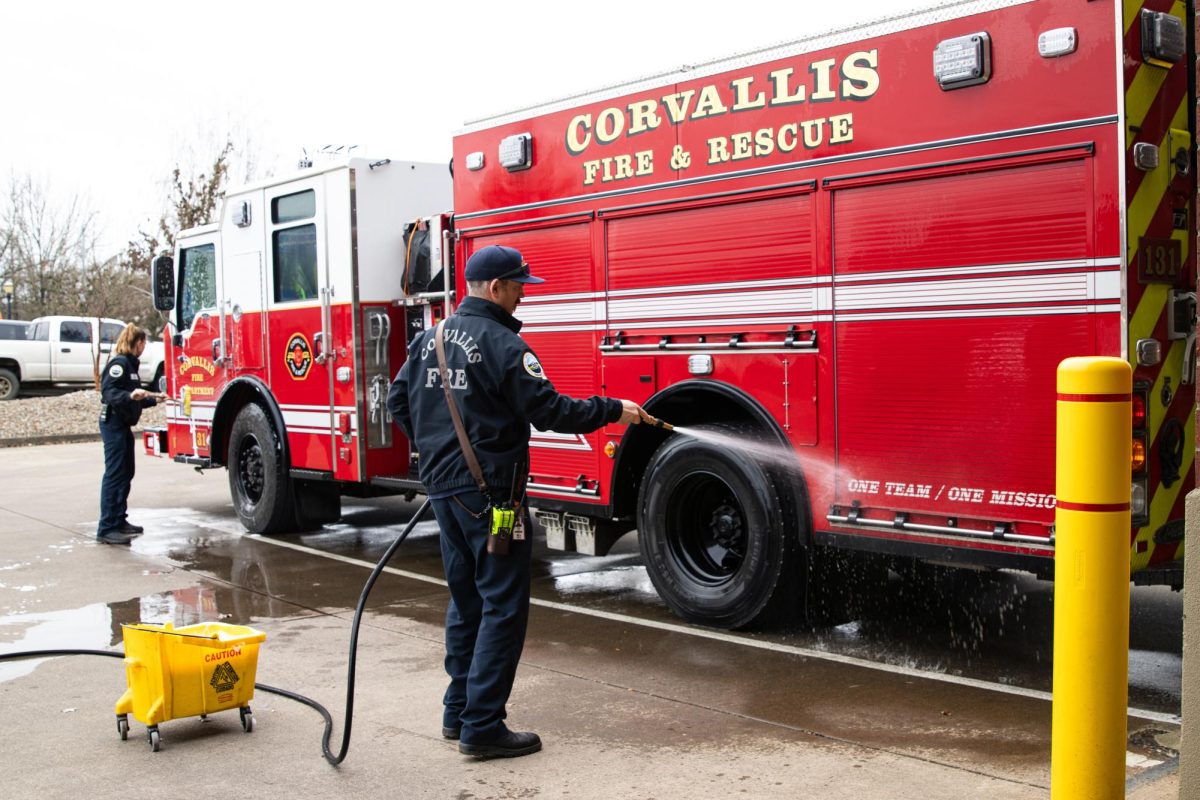Get to know your student leaders: ISOSU Directors Tina Kieu and Sakura Hamada
December 2, 2015
This year, the International Students of Oregon State University is led by co-directors Tina Kieu and Sakura Hamada. Both took on their positions as co-directors of ISOSU this year. Kieu is a fifth-year senior majoring in biology and Hamada is a senior studying human development and family science.
According to the duo, their responsibilities as co-directors are broken down into two jurisdictions: Kieu works with domestic students working in ISOSU affiliate programs. Hamada works to highlight and connect international students.
This year, with new spaces at their disposal and new goals in mind, Kieu and Hamada said that they are working to rebuild and update the ISOSU programs. This rebuilding, according to Kieu and Hamada, involves building more intent behind their work and respecting the student fees that fund their work. They hope that ISOSU can help students make connections and learn more about the communities around them.
“We are trying to accommodate the changing and transforming international community,” Kieu said. “The students are starting to change, people are starting to become more globally minded, international students are trying to reach out to maybe more traditional and domestic students, and as we’re transforming, we need to make sure that we are transforming with the community.”
Before getting involved with ISOSU, both Kieu and Hamada had had formative cultural experiences and were involved with ISOSU affiliates.
According to Louis Nguyen, International Resource Center Coordinator and a frequent collaborator with Kieu and Hamada, the two make an effective team. Nguyen described Kieu as organized and focused and Hamada as energetic and optimistic.
“The two combined together mesh really well to make a well-oiled machine,” Nguyen said. “It’s been really good and I’m really excited to work with them in the future.”
Kieu was born in the US and taught to speak Vietnamese before attending an English as a second language program in kindergarten. Since then, she has used English as her primary language.
Kieu credits her choice to come to OSU and her involvement in the OSU international community to her older sister, who attended OSU before her and encouraged her to get involved with the ISOSU affiliate Vietnamese Students Association. Kieu got increasingly more involved and served as president before applying for the position of ISOSU co-director.
Hamada was once an international student herself. Born in Japan, her family moved to the US when she was nine years old. At first, Hamada experienced difficulty feeling a part of her new community. Over time, she was able to learn English and she now no longer identifies as an international student.
However, through high school, she still often had to take ESL exams while she was taking Advanced Placement classes at the same time. According to Hamada, it was frustrating and even felt discriminatory at times.
After arriving at OSU, Hamada found the Japanese Students Association, where she immediately felt a sense of community. She was eventually selected to serve as the co-president of the JSA and then decided to apply for the position of ISOSU co-director.
The two first heard about each other two years ago after an event hosted by the Vietnamese Student Association. At the time, Kieu was the president of the VSA and, as part of the event, gave an emotional and tearful speech. According to Hamada, she remembered that this caused her to have an emotional response as well. From that moment, the two remembered each other as “the girl who cried with me.” Two years later, they were selected to serve as co-directors of ISOSU together.
Since taking on their positions, the two have made great efforts to embrace a collaborative spirit and work together.
“In my culture, it is custom to respect an elder, like anyone who’s older than you, so I respect her in that term, but also I respect her as a person, as a co-director,” Hamada said.
Both Kieu and Hamada plan to pursue careers in the medical field after college. They both also hope to carry their experiences and knowledge from their involvement with ISOSU into their careers. Kieu aspires to become a primary care physician and provide care to marginalized communities. Hamada has chosen to study HDFS so that she can take a different approach to medicine that incorporates social elements of health care into her work as well.


















































































![Newspaper clipping from February 25, 1970 in the Daily Barometer showing an article written by Bob Allen, past Barometer Editor. This article was written to spotlight both the student body’s lack of participation with student government at the time in conjunction with their class representatives response. [It’s important to note ASOSU was not structured identically to today’s standards, likely having a president on behalf of each class work together as one entity as opposed to one president representing all classes.]](https://dailybaro.orangemedianetwork.com/wp-content/uploads/2025/03/Screenshot-2025-03-12-1.00.42-PM-e1741811160853.png)
























